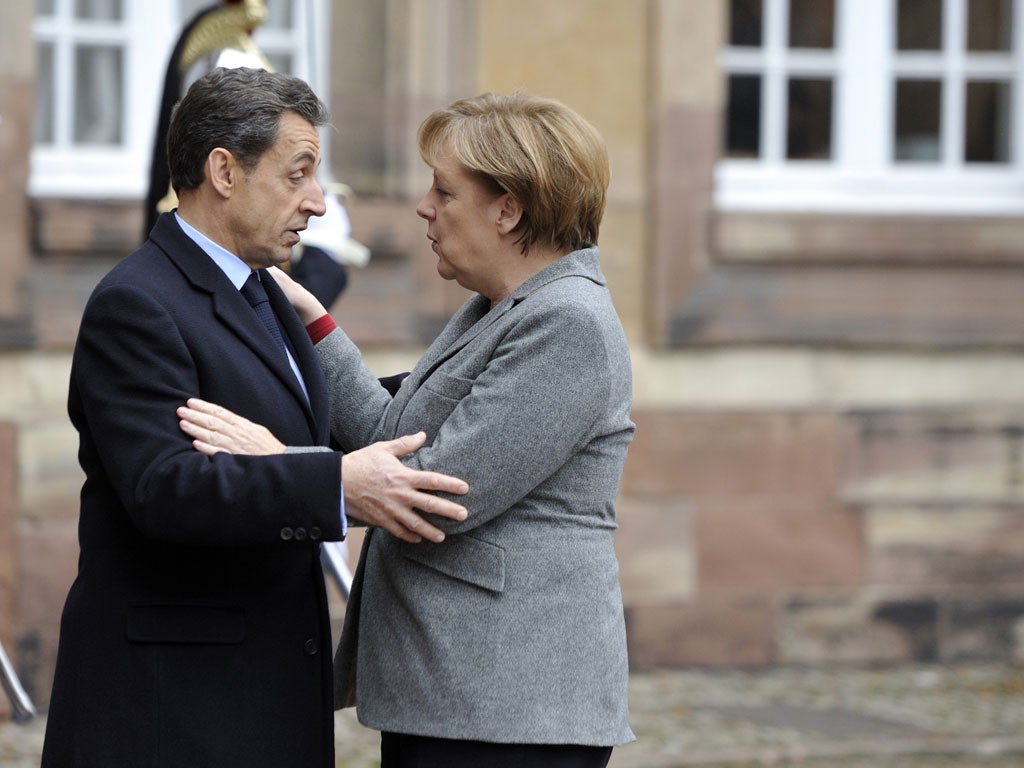Merkel and Sarkozy call for new EU treaty

David Cameron's difficulties with his party's Eurosceptics deepened tonight as France and Germany renewed calls for EU Treaty change to solve the single currency crisis.
After emergency talks in Paris, French President Nicolas Sarkozy and German Chancellor Angela Merkel said they wanted change to be carried out by all 27 member states if possible - or at least the 17 eurozone countries.
The aim would be to allow far tougher rules and sanctions governing the eurozone in future to reassure markets about the euro's long-term stability.
Downing Street insisted that the scale of the proposal - to be put to an EU summit later this week - did not amount to change warranting a referendum in the UK.
Deputy Prime minister Nick Clegg said as much yesterday, insisting a referendum was only needed if Treaty change meant giving up more UK sovereignty to Brussels.
But Work and Pensions Secretary Iain Duncan Smith sided with the Eurosceptic right in the Tory Party by suggesting that the impact from any Treaty change would demand a national vote.
"The Prime Minister has always been clear, if there are substantial changes that affect Britain's position, then he would go for a referendum because that's what we said to the British public we would do" said Mr Duncan Smith.
Tonight, as Tory Eurosceptics stepped up their referendum calls, Mr Cameron insisted nothing had changed to justify such a move.
Answering questions following a speech in London, the Prime Minister said: "Clearly, there are negotiations going on in Europe. I will be part of those negotiations on Thursday and Friday.
"If there is a Treaty at the level of 27, and if that passed powers from Britain to Brussels, there would be a referendum."
But he made clear he does not expect any Treaty change which would be significant enough to require a referendum, adding: "We have legislated now so that it is impossible for a British government to pass power from Britain to Brussels without asking the British people in a referendum first.
"As Prime Minister I am not intending to pass any powers from Britain to Brussels, so I don't think the issue will arise.
"But the British people should know that, as an absolute safeguard, if power goes from Britain to Brussels they get a say-so first, and quite right too."
Leading Tory eurosceptic Bill Cash insisted: "This is a major Treaty change whether it is for the eurozone-17 or the EU-27 because it fundamentally changes the relationship of Britain to the EU.
"It therefore requires a referendum, irrespective of the attempt to bypass the British people with the European Union Act this year.
"Ideally the Treaty should be vetoed but if the Government is determined to persist then it must hold a referendum."
He said the proposed Treaty change would pave the way for a "fiscal union" of the 17 eurozone countries, undermining the single market and destabilising the City of London. It amounted to "a bid for political union" and "the British people whose lives are affected must be allowed to have their say".
UK Independence Party leader and MEP Nigel Farage said: "If all member states are to implement Treaty changes, then David Cameron must give the people of the UK the referendum he promised.
"Failure to do so will see not only a Tory backbench revolt, but a rebellion at the ballot box."
He went on: "The Prime Minister must use this opportunity to finally let the people of the country have their say on the UK's future membership of the EU."
Mr Cameron, in a sop to the Eurosceptics, repeated his insistence on winning safeguards for the UK from any Treaty change.
"I have always said that if there is Treaty change in Europe then we will make sure that Britain gets something in order to enhance, protect, defend and promote our national interest in Europe. I think that is absolutely the key.
"There are very important things we want to safeguard, not least the single market, not least the importance of financial services, and other issues too."
The Paris talks marked the start of a week of intense efforts to settle a eurozone stability deal to convince markets once and for all that the single currency can survive the current economic turmoil.
The key plan is to toughen eurozone checks and balances -something lawyers say will need treaty change.
Mr Sarkozy said talks on a new treaty should be completed by March, allowing the swift introduction of automatic penalties for eurozone countries breaching debt and deficit thresholds, and closer-than-ever monitoring by Brussels of eurozone economic plans.
Mr Sarkozy described the new unity with Chancellor Merkel as "a forced march toward re-establishing confidence in the eurozone".
Coupled with fresh austerity measures in Italy and Ireland, announced over the weekend, the hope is that the 27 EU leaders can agree the details of the plan at their summit on Thursday and Friday.
France and Germany have dismissed calls for the creation of "eurobonds" as the answer to the debt crisis. That increases the odds on the European Central Bank acting as "lender of last resort" - something Mrs Merkel has until now rejected out of hand as a licence to print money, risking dramatic inflation.
PA
Join our commenting forum
Join thought-provoking conversations, follow other Independent readers and see their replies
Comments